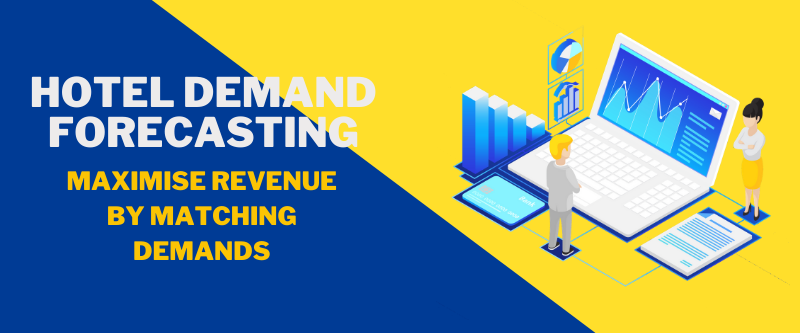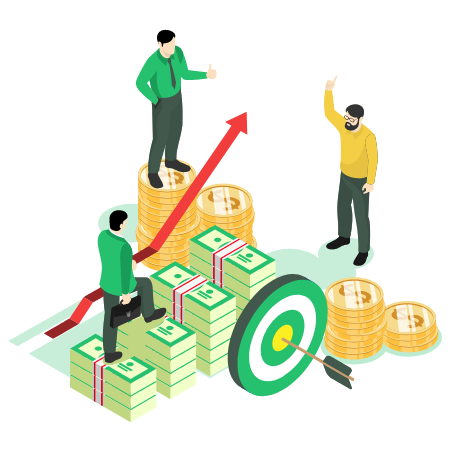Running a hotel business is hard; there are unforeseen risks involved. But you can always try to predict and plan for future events.
Hotels should try performing a systematic estimation of guests’ future preferences and align their operations accordingly.
This is where demand forecasting helps.
Demand forecasting in hotels is nowadays crucial. But it isn’t easy. Which is why most hotels struggle to understand and predict guests’ behavior.
Are you also finding it difficult?
If so, then don’t fret! I am here to help.
With this article, I will walk you through all the significant aspects of hotel demand forecasting and help you understand how hotels forecast demand the right way.
Table of Content
- What is Demand Forecasting in the Hotel Industry?
- Types of Demand Forecasting in Hotels
- Is Demand Forecasting Important for Hotels?
- How to Forecast Demand in Hotels?
- Set objectives
- Collect and record data
- Measure and analyse data
- Project trends
- Conduct market research
- Look at your budget
- Delphi technique
- Additional Aspects and Data to Focus on
What is Demand Forecasting in the Hotel Industry?
Hotel demand forecasting uses historical data to predict future guest demand over a defined period. This helps hotels in managing inventory in a much more effective fashion.
Over and above, predictions such as turnover, profit margins, cash flow, capital expenditure, and risk assessment, also depend on it.
Meaning, the more precise you are with your forecasting, the better business decision you can make for your hotel.
There are two kinds of forecasters: those who don’t know, and those who don’t know they don’t know.
John Kenneth Galbraith
Types of Demand Forecasting in Hotels
In a hotel, there are essentially three types of forecasting. Such as:
1. Operational forecasting
Operational forecasting in a hotel is about focusing on the operational aspects such as frontdesk, housekeeping and POS.
It considers factors like:
- Total housekeeping staff needed to clean rooms
- Number of guests walking into the reception area
- Number of guests dining in the restaurant (number of covers for breakfast, lunch, and dinner)
- The average spend per cover
- Purchasing pattern for both perishable as well as non-perishable restaurant products and equipment
2. Financial forecasting
This forecasting approach to hotel demand is about predicting how much the future expenses and revenue of the hotel will be.
It is essential when a hotel’s revenue depends on a particular period (season).
For example: A beachside hotel that mostly hosts surfers is likely to get more business during that time of the year when the waves are bigger and the swells are more reliable. So, financial forecasting is done to estimate the finances of the hotel during periods of low demand.
3. Revenue management forecasting
Revenue management forecasting is vital for hotels to stay profitable. This forecasting is done to predict when consumer demand rises and falls with the help of market data, including competitor pricing, and overall market performance.
So, if you want to set effective room rates and maximize your profit, then revenue management forecasting is a MUST for you.
If you don’t know in detail about revenue management, then we have an in-depth resource. You can click the button below to read.

Is Demand Forecasting Important for Hotels?
So far, we have learned about demand forecasting and its type in the hotel industry. Now, let’s address another important question.
There was a time when hotels didn’t double down on strategies of any kind. But with time, the industry evolved along with guest demands and preferences.
To keep abreast with all the transformations and to stay profitable at any time of the year, hotels had to find solutions.
Revenue managers filled some of the major voids in the industry. However, there was much more required. And demand forecasting then came into the picture.
Now, if you ask me if hotels really need demand forecasting, then the answer is a YES!
Forecasting guest/industry demand helps in efficient planning and decision-making for all the departments. Not to mention, it is one of the catalysts behind better pricing.
So, if you or your revenue manager haven’t turned to demand forecasting, then you must give it sincere thought.

How to Forecast Demand in Hotels?
Let’s address the elephant in the room.
While many hotels know about demand forecasting, they don’t know how to perform it exactly.
So, in this section, I will try to pen down the important aspects to help you forecast the right way.
1. Set objectives
The first and foremost thing you have to do is set your objectives.
Meaning, you have to define the purpose of your forecast. Why? Because it will help you determine what all resources and strategies you are going to need for the process.
For example: If the reason behind your forecast is just to see what the future of the hotel will be like without any operational changes, then you most probably don’t need a lot of things to do. But, if you have an objective of predicting the sales growth with changes in your marketing and operational strategies, then you might have to bet on sophisticated techniques.
2. Collect and record data
In forecasting, the most crucial thing is DATA. Without data, it’s almost impossible to predict anything (until and unless you’re a fortune-teller).
Here are the data that you must consider:
Historical data
Past data is nothing less than a gold mine. It has so much to offer.
Historical data tells a lot about how your hotel has performed in the past, what were the guests’ expectations and behavior, and more.
This data includes:
- Past sales or revenue
- Expenses
- Number of guests
- Employee turnover
- Booking patterns
- Lead time
Further, you can compare that data with the current one, predict future demands, and assess risks.
On-the-book (OTB) data
On-the-books (OTB) or business on-books (BOB) are two of the most common acronyms that are used interchangeably. These are measures used when looking ahead to see how occupancy or revenue is booked at a hotel.
This is one of those data that you shouldn’t overlook at any cost because you must always analyze current reservations.
This data can be found in your Property Management System (PMS).
Accurate forward-looking data
Forward-looking data is hat formation that is used to forecast future business conditions.
For example: It could be how much business a hotel has already got and how many rooms are still available for reservation.
When you have accurate forward-looking data, you can better align present business practices for greater success.
3. Measure and analyze data
When you have all the data gathered, what’s next is that you measure and analyze it thoroughly.
Data holds an immense amount of information. It tells you about everything that has happened in the past and what the future holds.
To set the emphasis higher — you have to use data and analytics the same way a drunken man uses lamp-posts for support.
Word to the wise: Try hiring a data analyst to do the job. These folks know how to make sense out of raw data and provide you with meaningful insights.
4. Project trends
Trend projection is one form of hotel demand forecasting. There’s no rocket science involved; hotels use past data and try to determine future happenings.
Let me give you an example:
Your hilltop hotel witnessed a massive spike in business last year. However, that doesn’t mean it will be the same this year. Guests booked with your hotel for a reason — people were flocking to your location to experience camping and trekking. Now, the place isn’t suitable for the same anymore.
When you forecast this trend, you’re basically one step ahead and pre-prepared for the upcoming season.
This trend project can also be done through surveys (which I have explained in the next point).
5. Conduct market research
Market research in hotel demand forecasting is about knowing and understanding what the market is up to. One of the best ways to do that is through surveys.
Now, it could be customer surveys or surveys for the general public. It is one of the time-consuming tasks but is highly beneficial.
When you gather all the data, you can not only predict future trends but also create certain guest personas to deliver better services.
This type of demand forecasting in the hotel industry is based on data from customer surveys. It requires time and effort to send out surveys and tabulate data, but it’s worth it. This method can provide valuable insights you can’t get from internal sales data.
Note: This method of conducting market studies on consumer behavior is also known as the market experiment method.
6. Look at your budget
A budget’s accuracy can make or break a hotel.
So, budget is also one of the factors that you must include when you’re forecasting demand. Look at your past budget and insights from your data, and analyze how your expenditure has changed YoY.
Further, if you want to know more about budgeting, we have a dedicated blog. You can check it out.

7. Delphi technique
Delphi technique or Delphi method is a structured communication technique (or you can call it a process) that relies on a panel of experts. These experts are surveyed in order to arrive at a group opinion or decision.
The same method can also be applied in hotels that are looking to construct consensus forecasts and improve their business.
Additional Aspects and Data to Focus on
Apart from the above-mentioned points, there are a few more things you might want to consider.
1. Top Accounts Expectations
For a precise prediction, you can also consider comparing your top accounts. You need to collect all the data and see from where you have recorded more business.
For example: You can compare whether you have gained more business from direct sales or OTA or offline travel agents. This will help you predict your future sales avenues and improve them.
2. Guest Loyalty and rebooking
Another aspect you might want to look at is your loyal guests. You have to keep a keen eye on the guests who have rebooked with you or are continuing to book with you.
With that, you can understand each guest and their preferences. This will help you predict what type of loyal guests you might serve in the coming months.
3. Holidays and events
Holiday seasons and certain events are catalysts. Hotel revenue managers can also look at data around these aspects and try to determine future demands.
Conclusion
The rate at which customer expectations are changing has become important for hotels to get their hands on sophisticated strategies and methods.
Hotel demand forecasting is one such method that helps hotels in making informed decisions. Hotels that are turning to it are reaping splendid benefits.
Therefore, it’s time that hotels that haven’t taken a step towards demand forecasting, should get their hands on it. If they can’t do it themselves, they can always hire the best revenue managers to do the job. These professionals know in and out of demand forecasting in the hotel industry and can forecast faster and more accurately.



